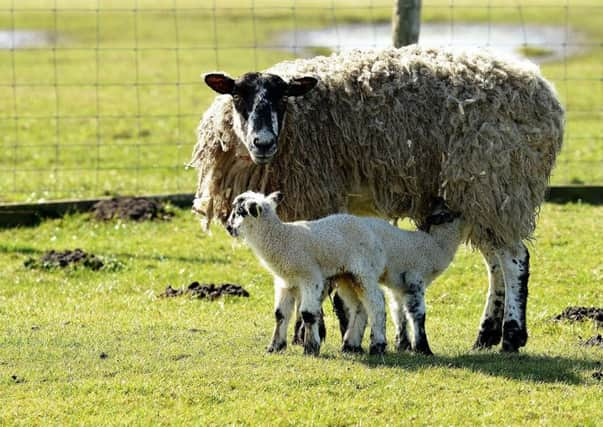Lamb aging rule change hit by costly U-turn
This article contains affiliate links. We may earn a small commission on items purchased through this article, but that does not affect our editorial judgement.


Following a meeting with Government officials this week, the National Sheep Association (NSA) said it was “highly frustrated” and National Farmers’ Union (NFU) branded as “unacceptable” a major U-turn which followed assurances from former Farming Minister George Eustice that Britain’s exit from the European Union would allow the change to be made.
As reported by Country Week in November, the Government agreed to the introduction of a fixed cut-off date to determine the age of lambs, after years of industry lobbying for the move.
Advertisement
Hide AdAdvertisement
Hide AdThe new system was expected to be implemented in time for June this year, replacing less precise teeth checking methods to determine a lamb’s age and whether the carcase needed to be split.
But the NSA said this now looks likely to be “abandoned” after industry bodies met with officials from the Department for Food, Environment and Rural Affairs (Defra) on Monday.
At the meeting, farming organisations were told that Defra Ministers and the Government’s chief veterinary officer were concerned about the effects the change could have on the possible need for the UK to seek ‘third country’ status with the EU in the event of a no-deal or delayed Brexit.
In that scenario, without third country status, no British exports of live animals or animal products could enter the EU.
Advertisement
Hide AdAdvertisement
Hide AdA complication is that obtaining this status requires equivalent regulatory standards with the EU to be met and Ministers are said to be concerned that changing Britain’s lamb aging rules could represent a departure from the EU’s standards.
Prior to this week’s meeting however, the NSA said it had received assurances from Defra that the new rule had already been signed off at both a UK and EU level and that it would be implemented as soon as the Food Standards Agency was ready.
Phil Stocker, the NSA’s chief executive, said: “I agree fully with the absolute need for the UK to maintain or regain third country listing with the EU... access to the EU market is crucial, not just for the sheep sector but for other farming and food sectors too.
“But in November 2018, then Farming Minister George Eustice gave a statement giving the carcase splitting change the green light and this was followed by a written statement from Defra in December informing industry that approval had been given and the change would be introduced in spring 2019, to include lambs born in 2018.
Advertisement
Hide AdAdvertisement
Hide Ad“We were told a risk assessment had been done, everything had been cleared and, as the weeks progressed, we were being led to believe all we were waiting for was FSA to agree implementation procedures.”
Mr Stocker added: “This U-turn has raised the question of trust in Ministers, especially as it comes just days after Mr Eustice’s resignation from the Cabinet.
“He wrote to me shortly after the referendum boldly saying that if the EU won’t allow us to change our method of ageing then this will be one of the first things we will change when we are no longer a member state. We are now told that if we are no longer members of the EU, we don’t have the ability or latitude to make that change.
“Anyone still thinking that departure from the EU will result in freeing agriculture from nonsensical rules and regulations should think again. We have been told now that formal legislative change is needed, and this will require a consultation to take place.
Advertisement
Hide AdAdvertisement
Hide Ad“This is the first time we have heard anything about this, and it leads me to conclude there is no way this can take place this season.”
Richard Findlay, the NFU’s livestock board chairman, was also highly critical of the Government’s sudden U-turn.
He said: “It is unacceptable that this has now been completely overturned with no indication of when it will be implemented.
“It is needless to say that the delay in implementation is a huge setback for the UK sheep sector and that Defra’s failure to follow through on its commitment is extremely frustrating.”
Advertisement
Hide AdAdvertisement
Hide AdMr Findlay, who runs a hill flock on his farm in Westerdale near Whitby, added: “While we understand Defra’s concerns about negotiating the UK’s status as a third country... it should never prevent necessary domestic regulatory changes from taking place.”
Last autumn, the EU agreed to grant permission to member states to choose their own system of ageing sheep for TSE disease controls, however the same freedom was not extended to third countries outside the bloc.
Following the unexpected setback to the sheep industry, the National Farmers’ Union said it will continue to seek assurances from the Government that the new carcase splitting arrangements will be implemented in time for the 2020 season.
In a statement, a spokeswoman for Defra, said: “We are aware of the concerns from the sheep sector and the need to make progress on this matter.
Advertisement
Hide AdAdvertisement
Hide Ad“We will keep the sheep farming, the food processing and the retail industry closely updated on future implementation.”